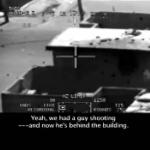Wikileaks Shows True Nature of War
 The Wikileaks video of a U.S. helicopter attack in Baghdad should remind us all that we can legislate the laws of war and refine the rules of engagement but, in the end, war will always be a grisly business.
The Wikileaks video of a U.S. helicopter attack in Baghdad should remind us all that we can legislate the laws of war and refine the rules of engagement but, in the end, war will always be a grisly business.Much has been said about the Wikileaks video of a U.S. Apache helicopter attack. Tragically, 12 people were killed, among them two Reuters employees. Much of the blogosphere seems outraged by the video’s contents (this Huffington Post “report” is typical), but I think a bit of perspective is needed.
For starters, Apache helicopters don’t fly around, spying on the population and shooting when they see something they don’t like. When many think of our wars in Iraq and Afghanistan, they imagine young soldiers or Marines walking through a sandy village, talking to locals and engaging enemy fighters when necessary. That may be simplistic, but it’s especially inaccurate when applied to American air power.
Generally, helicopters (and all air support) respond to the distress calls of infantrymen. This particular incident took place on July 12, 2007, in the middle of the Iraq surge, in one of Baghdad’s most dangerous neighborhoods. The troops on the ground reported sporadic enemy fire, and the Apaches’ presence was meant to ensure their safety.
It’s clear from the video that at least one of the Iraqis was armed, and another was thought to have an RPG (it was actually a camera). The Huffington Post accurately notes that rifle ownership is hardly rare on the streets of Baghdad, and suggests that the aircrew overreacted by firing. But that assumes a reasonably neutral set of circumstances. The Apache crews knew that their comrades were being fired on, and the armed men they found were less than 200 yards from their comrades’ position. When you know your friends have been shot at, and you find guys with guns only 200 yards away, it seems reasonable to assume the worst. When you then see one of the men raise an RPG to fire, inaction becomes irresponsible—after all, the lives of friends are in your hands.
Obviously the aircrews were mistaken. The RPG was in fact a camera, and it’s very likely that the men who lost their lives were not threats. The crew later fired on a van as it attempted to evacuate the wounded. Two children were hurt during this exchange, though they were later treated at an American military hospital. It was an obviously tragic and heartbreaking accident, but for many, the most unsettling aspect of the footage is not the attack, but the cavalier attitude that some of the aircrew show toward killing.
The New York Times points out that psychological necessity may force the gung-ho attitude displayed by the helicopter crews, and I can only lamely add that soldiers are people, too. We can legislate laws of war and refine rules of engagement, but war will always be a grisly business. I’m not a peacenik, and I supported the Iraq invasion on the merits, but it’s folly to send troops to do the toughest job and then be shocked by the attitude that some show while doing it.
The attitude of the helicopter crews may offend the sensibilities, but we shouldn’t be surprised by it, and we shouldn’t assume that all of our troops share it. Most importantly, we should remember just how dangerous Iraq is, and how threatening Baghdad was during July 2007. The troops may not have been very nice about how they did their jobs, but they didn’t violate any laws of war, either.
The incident, or more precisely the public’s reaction to it, does remind me of two things, though. The first is that while the mainstream left is largely supportive of our troops, there’s still a strand of progressivism that’s almost reflexively critical of our military. Cindy Sheehan’s perspective may not dominate the Democratic Party, but it’s still a part of the coalition.
The second is that of all of President Bush’s mistakes, his failure to emotionally prepare the American people for war is perhaps the most severe. We ought to demand the best of our troops, and do whatever necessary to rectify mistakes, but the American people are too often confused or shocked when things like this happen. Maybe we wouldn’t be if we understood the monumental difficulty of our task.